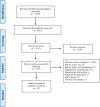Behavior change interventions in patients with type 2 diabetes: a systematic review of the effects on self-management and A1c
- PMID: 34900827
- PMCID: PMC8630317
- DOI: 10.1007/s40200-021-00846-8
Behavior change interventions in patients with type 2 diabetes: a systematic review of the effects on self-management and A1c
Abstract
Purpose: This study aimed to identify the characteristics of interventions employed to promote behavior change in people with type 2 diabetes mellitus (T2DM) and their impact on disease self-management and glycated hemoglobin (A1c).
Methods: The Preferred Reporting Items for Systematic reviews and Meta-Analyses (PRISMA) guidelines were used to guide the protocol development for this systematic review. Randomized controlled clinical trials which compared behavior change interventions to controls in adults with T2DM and investigated disease self-management and glycated hemoglobin (A1c) measured by validated methods were eligible for this study. The risk of bias and quality of evidence was assessed respectively by Cochrane's tool and grading of recommendations, assessment, development, and evaluation (GRADE).
Results: A total of 27 studies were included involving 4464 participants. Behavior change was mainly promoted by education sessions on diabetes care delivered face-to-face, monthly, or every other month, lasting more than 60 min, involving blood glucose monitoring, healthy eating, exercise, and medication. Four studies showed significant improvement in both disease self-management and A1c. The risk of bias was classified as high in most studies. A meta-analysis could not be performed for A1c and self-management due to the high differences in intervention parameters (delivery mode, number, duration, and frequency) and self-management assessments.
Conclusion: Low evidence of improvement in disease self-management and A1c considering only validated assessment methods were found for behavior change interventions, mainly promoted by education sessions on diabetes care. The quality of studies and probably the differences in intervention protocols contributed to this finding.
Prospero number: CRD42020161162.
Keywords: Diabetes mellitus type 2; Glycated hemoglobin A; Self-management; Self-management behaviors.
© Springer Nature Switzerland AG 2021.
Conflict of interest statement
Conflict of interestOn behalf of all authors, the corresponding author states that there are no conflicts of interest.
Figures
Similar articles
-
Psychological interventions to improve self-management of type 1 and type 2 diabetes: a systematic review.Health Technol Assess. 2020 Jun;24(28):1-232. doi: 10.3310/hta24280. Health Technol Assess. 2020. PMID: 32568666 Free PMC article.
-
Behavioural interventions for type 2 diabetes: an evidence-based analysis.Ont Health Technol Assess Ser. 2009;9(21):1-45. Epub 2009 Oct 1. Ont Health Technol Assess Ser. 2009. PMID: 23074526 Free PMC article.
-
Web-Based Interventions for Dietary Behavior in Adults With Type 2 Diabetes: Systematic Review of Randomized Controlled Trials.J Med Internet Res. 2020 Aug 28;22(8):e16437. doi: 10.2196/16437. J Med Internet Res. 2020. PMID: 32857059 Free PMC article.
-
The future of Cochrane Neonatal.Early Hum Dev. 2020 Nov;150:105191. doi: 10.1016/j.earlhumdev.2020.105191. Epub 2020 Sep 12. Early Hum Dev. 2020. PMID: 33036834
-
The effect of weight management interventions that include a diet component on weight-related outcomes in pregnant and postpartum women: a systematic review protocol.JBI Database System Rev Implement Rep. 2015 Jan;13(1):88-98. doi: 10.11124/jbisrir-2015-1812. JBI Database System Rev Implement Rep. 2015. PMID: 26447010
Cited by
-
Effectiveness of a hybrid technology enabled care model as measured by ICHOM standard set on established and managed type 2 diabetes already using medications: A RWE retrospective study.Metabol Open. 2023 Nov 11;20:100262. doi: 10.1016/j.metop.2023.100262. eCollection 2023 Dec. Metabol Open. 2023. PMID: 38115869 Free PMC article.
-
Feasibility of Remote Delivering an Exercise and Lifestyle Education Program for Individuals Living with Prediabetes and Diabetes in Brazil.Int J Environ Res Public Health. 2022 Dec 12;19(24):16697. doi: 10.3390/ijerph192416697. Int J Environ Res Public Health. 2022. PMID: 36554577 Free PMC article. Clinical Trial.
-
Improving Cooking Skills, Lifestyle Behaviors, and Clinical Outcomes for Adults at Risk for Cardiometabolic Disease: Protocol for a Randomized Teaching Kitchen Multisite Trial (TK-MT).Nutrients. 2025 Jan 16;17(2):314. doi: 10.3390/nu17020314. Nutrients. 2025. PMID: 39861444 Free PMC article.
-
Quality of health care in Primary Care: perspective of people with Diabetes Mellitus.Rev Bras Enferm. 2023 Oct 6;76(5):e20230008. doi: 10.1590/0034-7167-2023-0008. eCollection 2023. Rev Bras Enferm. 2023. PMID: 37820130 Free PMC article.
References
-
- International Diabetes Federation. IDF Diabetes Atlas, 8th edn. Brussels, Belgium: 2019. Available at: https://www.diabetesatlas.org.
-
- Dogru A, Ovayolu N, Ovayolu O. The effect of motivational interview persons with diabetes on self-management and metabolic variables. J Pak Med Assoc. 2019;69:294–300. - PubMed
Publication types
LinkOut - more resources
Full Text Sources



